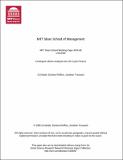Contingent Claims Analysis and Life-Cycle Finance
Author(s)
Bodie, Zvi; Ruffino, Doriana; Treussard, Jonathan
DownloadSSRN-id1084097.pdf (264.7Kb)
Metadata
Show full item recordAbstract
This paper explores the application of contingent claims analysis (CCA) to two "hot" issues in
life-cycle finance: (1) investing for retirement and (2) deciding when, if ever, to switch careers.
Participants in individual retirement accounts do not have the time or the knowledge to make
their own investment decisions. Today they are defaulted into life-cycle mutual funds that pass
all risk directly through to the participant. We use CCA to demonstrate how financial firms can
design and produce guaranteed contingent benefit contracts that improve participant welfare at
no additional cost to the system. In exploring the career-choice issue in the second part of the
paper, we use CCA in a somewhat different way. The decision to switch careers is analogous to
deciding when to exercise an American-style option to swap one asset for another. By applying
the methods used to analyze the option-exercise decision to the career-switching problem, we
gain some new insights beyond those derived from the traditional dynamic programming
approaches.
Date issued
2008-01-10Publisher
Cambridge, MA; Alfred P. Sloan School of Management, Massachusetts Institute of Technology
Series/Report no.
MIT Sloan School of Management Working Paper;4676-08
Keywords
contingent claims analysis, life-cycle finance, retirement saving plans